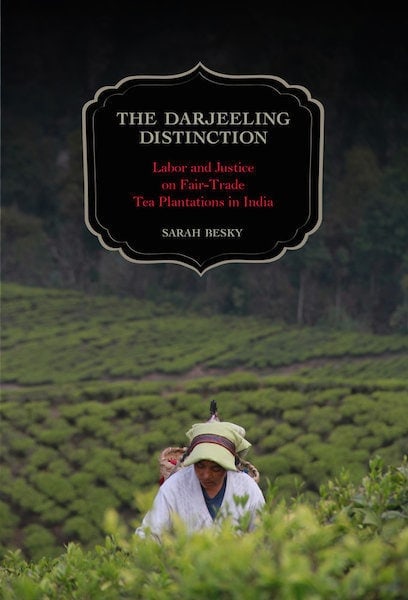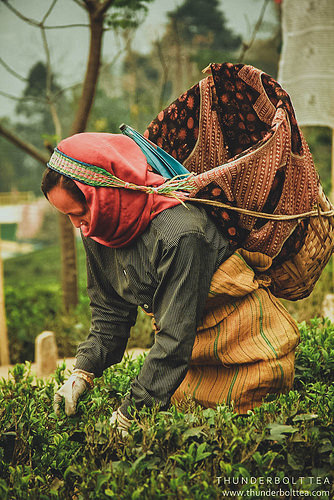In The Darjeeling Distinction, Sarah Besky provides a highly readable and theoretically ambitious ethnography of tea plantations in West Bengal’s Darjeeling district. Besky critically interrogates three “parallel visions of justice” (p.21): justice as property, justice as fairness and justice as sovereignty, represented by branding Darjeeling tea through geographical indication (GI), certification of plantations as fair trade, and the sub nationalist Gorkhaland movement for separate statehood, respectively.

These contending visions of justice are contrasted in the book with the moral economy of plantation workers, which Besky calls the “tripartite moral economy” (p.32). As articulated by female workers, this involves not only relationships of care and reciprocity between management and workers, but also between the management, workers and plantation landscape. This more-than-human moral economy between planters, pluckers and plants embodies a fourth vision of justice, nostalgically rooted in a past in which humans cared for tea bushes and management provided welfare to workers, a regime locally called faciliti-haru, in the form of housing, health care, or schooling. The piecemeal abandonment of faciliti-haru with economic liberalisation is the major complaint among the women of the plantation and is couched as a shift from industri to bisnis.
The Darjeeling Distinction shows that the dominant movements for justice are not only disconnected from the tripartite moral economy, but actually produce a double alienation that transforms plantation workers into imaginary agrarian subjects with little correspondence to everyday life on the plantation.
The book is structured in five main chapters (plus introduction and conclusion), of which three core chapters are each dedicated to one of the contending visions of justice – property, fairness, and sovereignty. After the introduction of Darjeeling tea as a commodity and the outline of the book, the very accessible first chapter (Darjeeling) outlines the political, environmental, and economic history of Darjeeling as well as the making of the colonial plantation system through the recruitment of Nepali labourers. The second chapter (Plantation) sets the scene of the monograph through a narrative ethnography, introducing the female tea labourers, their daily routine, the gendered division of labour, kinship and the social reproduction on the plantations – most importantly in their articulations of the tripartite moral economy in terms of industri and faciliti-haru. The third chapter (Property) critically engages producers’ efforts to secure intellectual property rights for Darjeeling tea under the geographical indicator (GI) regime established by the WTO. Besky discusses the flaws and contradictions of establishing notions of terroir, taste and craftsmanship in a production system based on semi-bonded labour. In this process, by activating a Third World agrarian imaginary in PR materials, historically feminised labour is transformed into traditional knowledge, and plantations into gardens. In chapter four (Fairness), Besky takes on fair trade initiatives and convincingly argues that that fair trade is part and parcel of a neoliberal logic of shifting the search for social justice to markets and consumers and away from state-led economic regulation. In the case of Darjeeling, this means that fair trade premiums are used to pay for facilities that plantations are required to provide anyway by the 1952 Indian Plantation Labour Act.
Fair trade recasts plantation managers as farmers and enlightened environmental stewards and is used to support arguments for a scaling back of the PLA. For workers, fair trade has neither improved their wages nor their living conditions, and is instead seen as part of the move from industri (socially embedded production) to bisnis and the deterioration of moral economy.
Chapter five (Sovereignty) provides a critical reading of the Gorkhaland movement for regional autonomy. The vision of justice-as-sovereignty entails a recasting of colonial histories of migration and labour into a primordial vision of belonging of Indian Nepalis to the Darjeeling landscape and the imagined benefits that would come from redefining the relationship of region to nation state, without, however, questioning the political economy of the plantation system.
The conceptual achievement of Besky lies in bringing food studies and critical geography concerns into anthropology. Besky displays a remarkable will in remaining conceptually innovative and bringing to bear a variety of authors, concepts and frameworks on her material. Naturally not all of these ideas could be followed through and some of them seem like unfulfilled promises, the most regrettable of which is the fleeting engagement with a multi-species perspective (p.65). I would have liked to see a more consequential elaboration of the theoretical consequences of a more-than-human approach to agrarian relations and socio-natural commodities. In The Darjeeling Distinction, the third part of the tripartite moral economy, the relation between humans and agro-environments, remains ethnographically and theoretically below its potential. It would have been interesting to read much more about what the management and workers have to say about Darjeeling’s plants, soils and climates, their health, fertility and the co-production of plants and political economy. The cursory treatment of the ontological challenge of the multispecies perspective, suggested but not elaborated in the notion of tripartite moral economy, may also be related to Besky’s remarkable silence on the issue of organic certification on tea plantations, although most plantations seem to be certified organic on top of being fair trade. I take these and other loose ends in the book as promises of more to come.

Besky, Sarah. 2014. The Darjeeling Distinction: Labor and Justice on Fair-Trade Tea Plantations in India. Berkeley: University of California Press. 264 pp. Pb: £19.95. ISBN: 9780520277397






